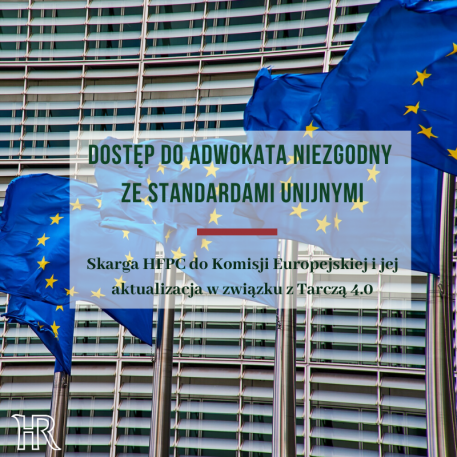
Access to a lawyer against EU standards – HFHR amends its complaint to the European Commission in response to the recent Covid-19 emergency measures
In February 2020, the Helsinki Foundation for Human Rights lodged a complaint with the European Commission concerning the absence of proper domestic implementation of the directive of 22 October 2013 on the right of access to a lawyer in criminal proceedings.
The HFHR decided to prepare a complaint to the European Commission in response to the ineffective expiry of more than three years from the date for the implementation of the EU law addressing, above all, the fundamental right to a defence in criminal proceedings, which was laid down in the Directive adopted more than six years ago.
According to a timetable adopted at the EU level, the Member States had until 27 November 2016 to implement the directive. In the Foundation’s opinion, Polish laws, and especially the provisions of the Code of Criminal Procedure, are yet to comply with EU law.
On 24 June 2020, the HFHR decided to amend its submission to address the legislative changes introduced in the latest Government’s Covid-19 emergency package, known as the “Anti-crisis Shield 4.0”. The newly adopted laws allow courts to hold pre-trial detention hearings of the detained accused over a video link.
Access to a lawyer still restricted
The HFHR has repeatedly drawn attention to the problems with access to a lawyer in Poland.
“There are three crucial aspects of the EU directive: the consultation with a lawyer immediately after arrest and before the first interview, an absolute confidentiality of lawyer-client contacts and the effective remedies in cases where access to a lawyer is denied”, says Dr Katarzyna Wiśniewska, Coordinator of the HFHR Strategic Litigation Programme.
The present practice of criminal justice authorities in Poland concerning the provision of access to a lawyer at an early stage of proceedings cannot be considered compatible with the spirit and letter of the Directive. The HFHR believes that this practice is a consequence of imprecise legislation and the vagueness of the measures adopted, as well as of the absence of relevant statutory instruments.
Although formally any detained person has the right to contact a lawyer, in reality making such contact is difficult, especially if the detained person does not have a telephone number of a specific lawyer or does not yet have an appointed legal aid lawyer.
These difficulties are primarily caused by the following factors:
- There are no legal provisions that would oblige police officers to make a list of lawyers available at police stations or to set up a system ensuring that lawyers of choice are available to arrested persons and suspects;
- The rule establishing the time-frames for ensuring access to a lawyer for arrested persons and suspects is vaguely phrased;
- There is no guarantee that the first interview will be aborted or postponed if access to a lawyer is not provided.
The outbreak of SARS-CoV-2 coronavirus and recent amendments to the Code of Criminal Procedure
Taking into account the recent amendments to the Code of Criminal Procedure introduced by the Act of 19 June 2020 on the interest relief available for business operators that have obtained bank credit to ensure their financial liquidity in the wake of the Covid-19 pandemic (Anti-crisis Shield 4.0), the HFHR has decided to amend its complaint submitted to the European Commission.
“The way in which video linked pre-trial detention and trial hearings are organised directly contravenes the Access to a Lawyer Directive. The new rules restrict suspects’ ability to contact a lawyer before the court hearing”, says Adam Klepczyński, a lawyer working with the HFHR.
At the same time, the new rules fail to ensure the confidentiality of defence lawyers’ communication with their clients. For example, no such confidentiality may be ensured in a situation where a Prison Service officer accompanies the suspect during a video linked pre-trial detention hearing. The HFHR argue in the amended complaint that the above procedural changes are to become permanent, and not just for the duration of an epidemic emergency.
What is the complaint to the European Commission?
The European Commission is responsible for monitoring compliance with EU law by the Member States at all stages of its domestic implementation and ensuring that Member States’ national laws and practices are consistent with EU law. Therefore, anyone can submit a complaint about the non-implementation or incorrect implementation of a directive. When the Commission considers that a complaint is founded, it requests the Member State to respond to the complaint as well as to the Commission’s position on the complaint. If the Member State fails to reply or if the reply is insufficient, the Commission issues a “reasoned opinion”, indicating that the Member State is in breach of Community law and calling on the Member State to remedy the infringement within a specified period. However, if the Member State does not comply with the opinion within the period laid down by the Commission, the latter may bring the matter before the Court of Justice of the European Union.
Documents to download:
- The original HFHR complaint to the European Commission
- The amendment to the HFHR complaint to the European Commission
Further references:
- HFHR: Has the Access to a Lawyer Directive been properly implemented? Ministry of Justice: Polish law complies with the Directive
- Klepczynski, P. Kładoczny, K. Wiśniewska, O (nie)dostępnym dostępie do adwokata
- Grabowska-Moroz, Wzmocnienie praw procesowych w postępowaniu karnym – skuteczne wdrożenie prawa do obrońcy i pomocy prawnej na podstawie Programu Sztokholmskiego
- Grabowska-Moroz, Inside Police Custody – Procedural Rights at Police Stations. State report Poland
- The List of Proposals of the Helsinki Foundation for Human Rights, National Bar Council and Warsaw Bar Association


24.06.2020
 Cookies EN
Cookies EN